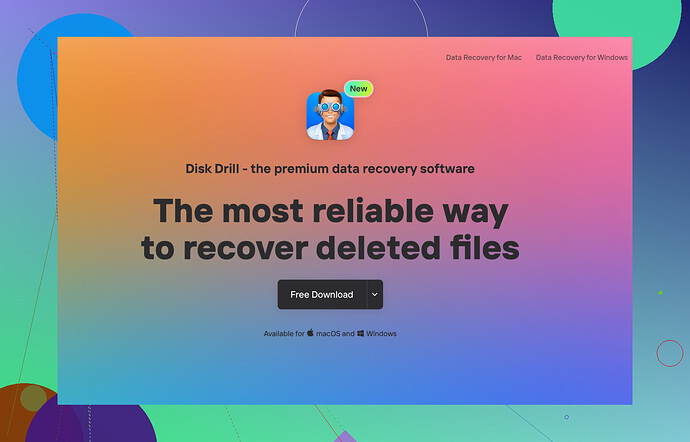Accidentally deleted important photos from my SD card. Need recommendations for effective and reliable SD card recovery software to get them back. Any help is appreciated!
You know, for recovering deleted photos from an SD card, I’d strongly recommend using Disk Drill for Windows. This software is super effective and reliable, based on my personal experience. It scans your SD card thoroughly to recover files that you’ve accidentally deleted.
If you haven’t written any new data on the card since deleting the photos, your chances of recovery are pretty high. Plus, Disk Drill for Windows has a user-friendly interface, making it easy to navigate, even if you’re not tech-savvy. It’s also pretty versatile; it works with various file formats, ensuring comprehensive data recovery.
You can download it and try the free version first. Just remember, the sooner you start the recovery process, the better your chances are of getting those important photos back.
For others looking for reliable recovery tools, here’s more on Data Recovery Software for Windows.
This tool can save you a lot of hassle and headache when dealing with lost data.@nachtdromer made some solid points about Disk Drill for Windows. I’d like to share another great option: Recuva. This tool is also known for its effectiveness in recovering deleted photos and files from SD cards.
What makes Recuva stand out is its deep scan mode, which digs through your SD card more thoroughly to uncover lost data. It’s free for basic use, and if you need more advanced features, you can always opt for the professional version. The software supports a wide range of file formats, so you should have no trouble recovering your photos.
One thing to keep in mind is that Recuva’s interface might not be as intuitive as Disk Drill’s, but it gets the job done. If you’re somewhat tech-savvy, you should find your way around it without much hassle.
And remember, the key to successful recovery is to avoid writing any new data to the SD card. The more you use it after deletion, the harder it becomes to retrieve those lost files.
Overall, Disk Drill for Windows and Recuva are both excellent choices, each with its pros and cons. You might want to try out both to see which one works best for your situation.
For a detailed review, you might find this helpful: Disk Drill for Windows Review on Reddit. It provides more insights into the recovery process and user experiences.
Just a quick thought here. While @viajantedoceu and @nachtdromer have mentioned Disk Drill for Windows and Recuva as strong contenders, I’d like to throw another option into the mix - PhotoRec. This freeware, open-source recovery software has been particularly useful for me. It’s capable of recovering a wide array of file formats, not just photos, and has done wonders for recovering data from damaged SD cards.
Yes, the interface can be a bit intimidating for beginners - it’s not as sleek or user-friendly as Disk Drill, but it’s highly effective. The command-line interface might seem daunting, but there are plenty of tutorials to help you navigate.
Disk Drill for Windows indeed is a solid choice, particularly because of its user-friendly interface and versatility across different file formats, which @nachtdromer pointed out. One of its biggest pros is how intuitive it is to use. Even if you’re not super tech-savvy, you can find your way through the recovery process quite easily. However, one con worth mentioning is that the free version of Disk Drill has limitations when it comes to the amount of data you can recover; to get the full benefits, you’ll need to consider the pro version.
On the other hand, Recuva is great with its deep scan feature. Sure, its interface isn’t the most modern, but if you can look past that, it performs the task efficiently.
In a nutshell, if you prioritize a user-friendly experience and are okay with possibly investing in a pro version, Disk Drill for Windows could indeed be your best bet. If you’re more comfortable with a bit more tech-savvy digging and prefer an open-source solution, PhotoRec might be worth a try.
Finally, to cap it all, avoid writing any more data to your SD card. This critically influences the potential success of your recovery, as overwriting data can make those lost files unrecoverable. Good luck!
